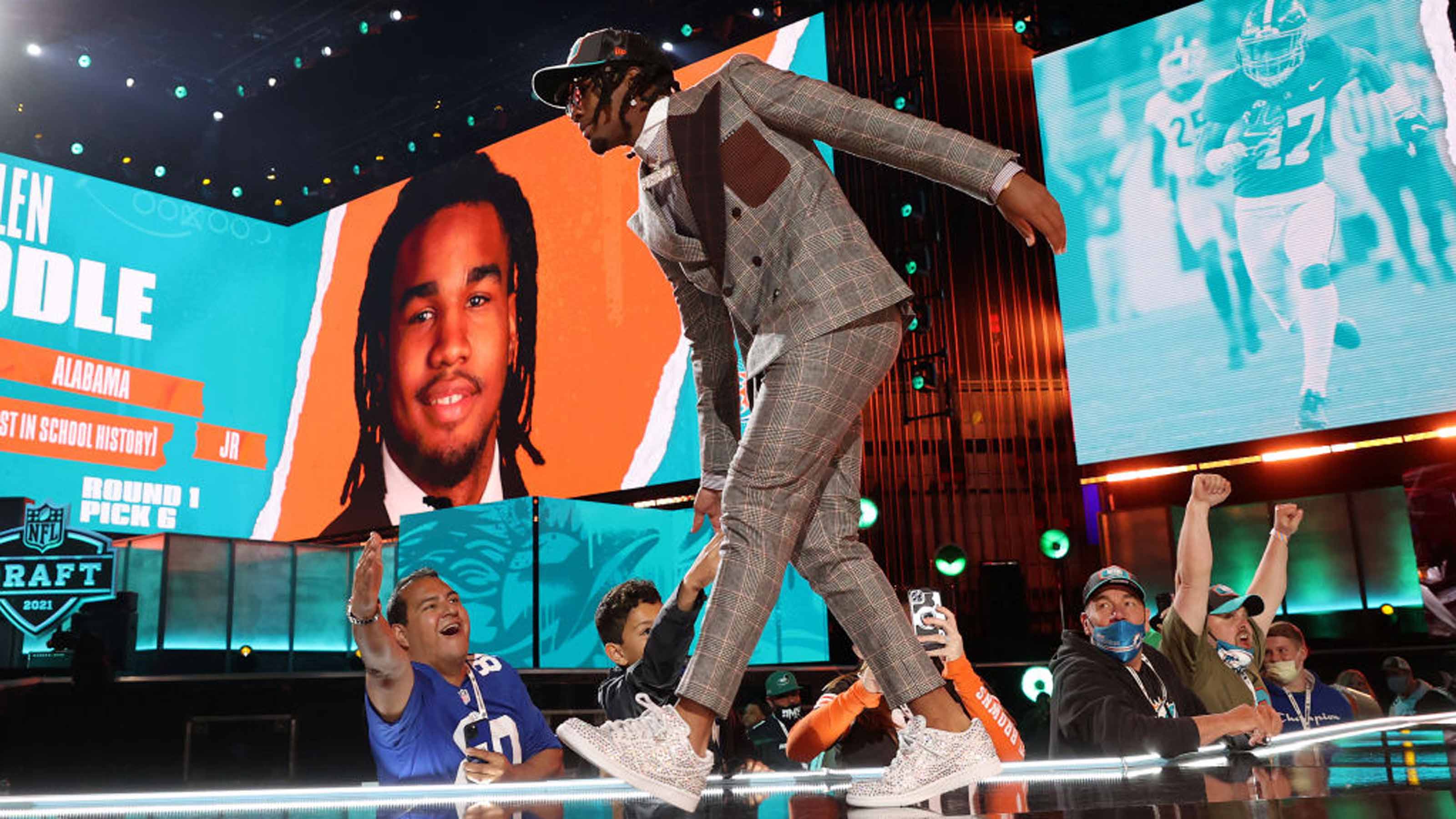How NFL Draftees Can Avoid Going Broke
It’s an all-too-common fate for many — but it’s avoidable with a little planning, according to a financial planner specializing in helping professional athletes who has seen it all.


Profit and prosper with the best of Kiplinger's advice on investing, taxes, retirement, personal finance and much more. Delivered daily. Enter your email in the box and click Sign Me Up.
You are now subscribed
Your newsletter sign-up was successful
Want to add more newsletters?

Delivered daily
Kiplinger Today
Profit and prosper with the best of Kiplinger's advice on investing, taxes, retirement, personal finance and much more delivered daily. Smart money moves start here.

Sent five days a week
Kiplinger A Step Ahead
Get practical help to make better financial decisions in your everyday life, from spending to savings on top deals.

Delivered daily
Kiplinger Closing Bell
Get today's biggest financial and investing headlines delivered to your inbox every day the U.S. stock market is open.

Sent twice a week
Kiplinger Adviser Intel
Financial pros across the country share best practices and fresh tactics to preserve and grow your wealth.

Delivered weekly
Kiplinger Tax Tips
Trim your federal and state tax bills with practical tax-planning and tax-cutting strategies.

Sent twice a week
Kiplinger Retirement Tips
Your twice-a-week guide to planning and enjoying a financially secure and richly rewarding retirement

Sent bimonthly.
Kiplinger Adviser Angle
Insights for advisers, wealth managers and other financial professionals.

Sent twice a week
Kiplinger Investing Weekly
Your twice-a-week roundup of promising stocks, funds, companies and industries you should consider, ones you should avoid, and why.

Sent weekly for six weeks
Kiplinger Invest for Retirement
Your step-by-step six-part series on how to invest for retirement, from devising a successful strategy to exactly which investments to choose.
Life as an NFL player can be interesting. For example, you get a reverse trajectory with your money — a lump sum of what could very well be your retirement savings, kids' college funds, and mortgages all in one.
Without careful management, former NFL players can end up in financial ruin and full of regrets. In the three years or less that the average pro NFL career lasts, players can expect to make about $2 million a year. As co-founder of Athlete Essentials — a wealth management firm with financial planning and brand consultant services catering to professional athletes — it’s been my experience that NFL draftees are usually not equipped to handle that kind of money or manage it well enough to last the rest of their lives.
The stakes are high. Together with weekly salaries, hefty bonuses and other payments, these players get one shot at setting themselves up for life.
From just $107.88 $24.99 for Kiplinger Personal Finance
Become a smarter, better informed investor. Subscribe from just $107.88 $24.99, plus get up to 4 Special Issues

Sign up for Kiplinger’s Free Newsletters
Profit and prosper with the best of expert advice on investing, taxes, retirement, personal finance and more - straight to your e-mail.
Profit and prosper with the best of expert advice - straight to your e-mail.
While a solid financial plan backed up by strict discipline can help build a sustainable lifestyle for these players, they should also consider external support to achieve this lifetime goal.
The Problem with Professional Athletes and Money
Statistics suggest that up to 78% of NFL players go bankrupt or fall into severe financial stress within just two years of retirement. For basketball players, the figures are only slightly better at 60% of financial ruin within five years of retirement.
A lot of money comes to draftees as a lump sum signing bonus, essentially front-loading their careers while they're still getting their toes wet in the world. As a direct consequence, many of them fall into a lavish lifestyle characterized by million-dollar cars, mansions, extravagant parties and more.
By the third or fourth year of their careers, players are already straining to live up to their former lavish lifestyle without their bonuses. This unsustainability spirals over time and creates a financial burden, even before players approach retirement.
Why Is This Happening?
It's easy to pin this lack of financial wisdom on youthful age and lack of experience, but the problem goes deeper than that. The fact that this situation is so widespread in professional sports shows just how chronic this problem has proved to be. Even older players, who should know better than to blow their salary so quickly, are often grappling with personal expenses and draining their income through living an unsustainable lifestyle.
A complete lack of financial guidance contributes greatly to this problem. Given that successful athletes in the NFL and other high-paying professional leagues make up only a small percentage of the industry, there is little systemic support and mentorship available to them. Additionally, young players rarely have any teammates to model good financial decision-making from. With so few good financial role models, poor financial decision-making is often passed from generation to generation, thus continuing the cycle.
What NFL Draftees Can Do to Better Manage Their Finances
The challenge of financial management for NFL draftees and pro-league athletes is simple enough to diagnose. The solutions are also straightforward, although not so easy to implement.
Develop a Budget
According to Bleacher Report, former Lions wide receiver Michael Rothstein is one example of a player who has saved money for his family by sticking to a budget of $60,000 a year. While this is certainly a comfortable livelihood, Rothstein’s $3.6 million four-year contract left enough ensured that he could save the lion's share of his income for the future.
This is just one case where setting up and sticking to a strict budget can save the day for NFL draftees. CNBC also has a list of other pioneers who live like they're broke to make the future brighter for themselves and their families.
Work with a Financial Adviser
With all the money coming in, it's a little hard to restrict yourself to a limited budget. A financial adviser is often the missing link to effective wealth management and investment in the future.
Rich athletes will often retain the services of top financial advisers to help them manage their spending habits and store away the bulk of their earnings in a safe, prosperous investment portfolio.
According to NBC Sports, veteran NFL safety Glover Quinn decided to save 70% of his after-tax income, which in total amounted to over $33 million. By maintaining a reasonable lifestyle, Glover will continue to enjoy a comfortable retirement, whether he works another day in his life or not.
Treat Yourself, Then Save
Trying to ignore the urge to splurge is almost as bad as giving in to it. These young players are likely to cave in from pressure at some point, and the key is to control it. Thus, with the help of a trusted adviser, draftees can decide whether or not to spend big on meaningful assets, such as houses or art.
Once this controlled spending spree is over, they will have a better chance of holding off and save money. Plus, these assets can be leveraged later in life as part of their investment portfolio.
The Biggest Threats to Financial Prosperity for NFL Draftees
To NFL draftees, the biggest threat to long-term financial security is not the taxman. These threats to financial security often come wrapped in good intentions.
One of these comes in the form of close family members and friends who often expect the rich draftees to fund their expensive lifestyles. With houses, exotic cars and strings of dependents, the money can run out quickly.
The players themselves can also sign away a lot of their money when trying to invest in supposedly good deals. These investment opportunities often look good on paper but end up being massive losses. This is just another reason why the support of a financial adviser who can decipher good business opportunities and stave off money-hungry relatives can make all the difference.
With all these, there is always the pressure to keep up with the extravagance of less prudent colleagues. For new draftees especially, it can be enormously tempting to “keep up” with the extravagant spending of your teammates, even if it harms your long-term wealth.
What NFL draftees and professional athletes need to know is how to live as if the last contract they signed is really their last. By counting their pennies, they can take a crucial step toward avoiding the terrible regret of a riches-to-rags story.
Profit and prosper with the best of Kiplinger's advice on investing, taxes, retirement, personal finance and much more. Delivered daily. Enter your email in the box and click Sign Me Up.

Ron L. Brown, CFP, is the co-founder of Athlete Essentials and president of R.L. Brown Wealth Management. He is an expert in wealth management, retirement planning, tax and estate planning, and business management. Ron takes pride in his work to support clients in reaching their individual financial goals. He graduated from Asbury University in 2003 and earned his CFP, Certified Financial Planner, credential in 2017. Learn more at athessentials.com and rlbrownwealth.com.
-
 Quiz: Do You Know How to Avoid the "Medigap Trap?"
Quiz: Do You Know How to Avoid the "Medigap Trap?"Quiz Test your basic knowledge of the "Medigap Trap" in our quick quiz.
-
 5 Top Tax-Efficient Mutual Funds for Smarter Investing
5 Top Tax-Efficient Mutual Funds for Smarter InvestingMutual funds are many things, but "tax-friendly" usually isn't one of them. These are the exceptions.
-
 AI Sparks Existential Crisis for Software Stocks
AI Sparks Existential Crisis for Software StocksThe Kiplinger Letter Fears that SaaS subscription software could be rendered obsolete by artificial intelligence make investors jittery.
-
 Social Security Break-Even Math Is Helpful, But Don't Let It Dictate When You'll File
Social Security Break-Even Math Is Helpful, But Don't Let It Dictate When You'll FileYour Social Security break-even age tells you how long you'd need to live for delaying to pay off, but shouldn't be the sole basis for deciding when to claim.
-
 I'm an Opportunity Zone Pro: This Is How to Deliver Roth-Like Tax-Free Growth (Without Contribution Limits)
I'm an Opportunity Zone Pro: This Is How to Deliver Roth-Like Tax-Free Growth (Without Contribution Limits)Investors who combine Roth IRAs, the gold standard of tax-free savings, with qualified opportunity funds could enjoy decades of tax-free growth.
-
 One of the Most Powerful Wealth-Building Moves a Woman Can Make: A Midcareer Pivot
One of the Most Powerful Wealth-Building Moves a Woman Can Make: A Midcareer PivotIf it feels like you can't sustain what you're doing for the next 20 years, it's time for an honest look at what's draining you and what energizes you.
-
 I'm a Wealth Adviser Obsessed With Mahjong: Here Are 8 Ways It Can Teach Us How to Manage Our Money
I'm a Wealth Adviser Obsessed With Mahjong: Here Are 8 Ways It Can Teach Us How to Manage Our MoneyThis increasingly popular Chinese game can teach us not only how to help manage our money but also how important it is to connect with other people.
-
 Looking for a Financial Book That Won't Put Your Young Adult to Sleep? This One Makes 'Cents'
Looking for a Financial Book That Won't Put Your Young Adult to Sleep? This One Makes 'Cents'"Wealth Your Way" by Cosmo DeStefano offers a highly accessible guide for young adults and their parents on building wealth through simple, consistent habits.
-
 Global Uncertainty Has Investors Running Scared: This Is How Advisers Can Reassure Them
Global Uncertainty Has Investors Running Scared: This Is How Advisers Can Reassure ThemHow can advisers reassure clients nervous about their plans in an increasingly complex and rapidly changing world? This conversational framework provides the key.
-
 I'm a Real Estate Investing Pro: This Is How to Use 1031 Exchanges to Scale Up Your Real Estate Empire
I'm a Real Estate Investing Pro: This Is How to Use 1031 Exchanges to Scale Up Your Real Estate EmpireSmall rental properties can be excellent investments, but you can use 1031 exchanges to transition to commercial real estate for bigger wealth-building.
-
 Should You Jump on the Roth Conversion Bandwagon? A Financial Adviser Weighs In
Should You Jump on the Roth Conversion Bandwagon? A Financial Adviser Weighs InRoth conversions are all the rage, but what works well for one household can cause financial strain for another. This is what you should consider before moving ahead.